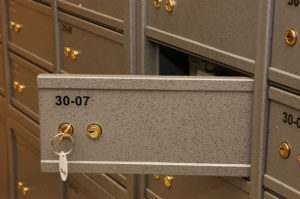Things You Should Not Keep in Your Safe Deposit Box

A safe deposit box isn’t a smart choice for everything. Kiplinger’s recent article entitled “9 Things You’ll Regret Keeping in a Safe Deposit Box” advises that there are some items you might not want to lock away in your bank, which isn’t open nights, holidays, or weekends. During this pandemic, hours of operation for many businesses are reduced. Some financial institutions have temporarily closed some locations. There are other banks that require an appointment for in-branch services, like accessing your safe deposit box. This could create a headache if you’re trying to retrieve important documents or items when you need them.
Here are some items you should store elsewhere, because may need to access them more often or on short notice.
Cash. Keeping a large amount of cash in a safe deposit box isn’t a good idea. If you need it at a time when the bank is closed, you’re out of luck. In addition, the cash may lose its buying power over time because of inflation. You may also find that some banks don’t allow cash in a safe deposit box. Finally, cash in a safe deposit box isn’t protected by the FDIC. To have FDIC insurance (covering up to $250,000 per depositor per insured bank), your cash needs to be deposited in a qualifying deposit account, such as a checking account, savings account, or CD.
Your Passport. If you need to take an emergency trip, you would not be able to pick up your passport during non-banking hours. If your travel requires a passport, there’s not much you can do about those calls in the middle of the night requiring you to travel immediately.
The Original of Your Will. It may not be a good idea to keep your original will in a safe deposit box because after your death, the bank may require the executor named in your will to obtain a court order to access the safe deposit box. That could mean a long and expensive delay before your will is probated and your estate is settled.
Funeral and Burial Instructions. Many people execute a legal document regarding the disposition of their remains or write a letter of instruction with funeral arrangements to accompany their will. The problem is that, if these instructions are hidden away in your safe deposit box, they may not be read in time to have any effect.
Uninsured Jewelry and Collectibles. Heirloom jewelry and your valuable stamp collection and rare coins are good candidates for a safe deposit box, but they must be properly insured. The FDIC doesn’t insure safe deposit box contents, and neither does the bank, unless it’s stated in your agreement.
Any Illegal or Dangerous Items. Your bank should provide you with a list of items that are not permissible to keep in a safe deposit box. This will include things like firearms, illegal drugs and hazardous materials.
You may also be interested in https://galligan-law.com/does-your-estate-planning-include-your-online-account-passwords/.
Reference: Kiplinger (June 1, 2020) “9 Things You’ll Regret Keeping in a Safe Deposit Box”

